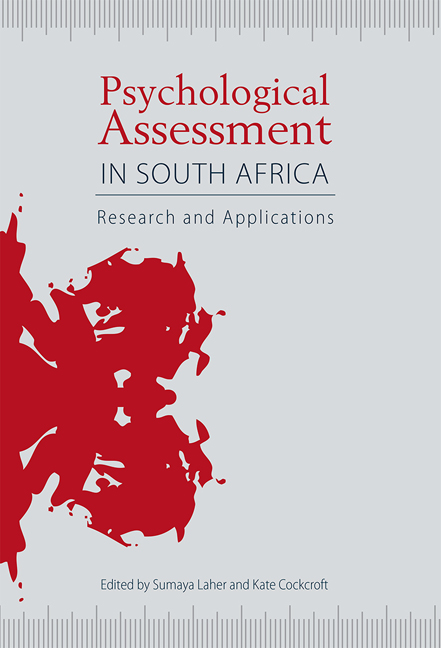Book contents
- Frontmatter
- Contents
- Tables and figures
- Acknowledgements
- Acronyms and abbreviations
- 1 Contextualising psychological assessment in South Africa
- Section One Cognitive tests: conceptual and practical applications
- 2 WAIS-III test performance in the South African context: extension of a prior cross-cultural normative database
- 3 WISC-IV test performance in the South African context: a collation of cross-cultural norms
- 4 The Senior South African Individual Scales – Revised: a review
- 5 Assessing school readiness using the Junior South African Individual Scales: a pathway to resilience
- 6 School readiness assessment in South Africa
- 7 The Kaufman Assessment Battery in South Africa
- 8 The Das-Naglieri Cognitive Assessment System
- 9 Dynamic assessment in South Africa
- 10 The Learning Potential Computerised Adaptive Test in South Africa
- 11 APIL and TRAM learning potential assessment instruments
- 12 The Griffiths Mental Development Scales: an overview and a consideration of their relevance for South Africa
- 13 Neuropsychological assessment in South Africa
- Section Two Personality and projective tests: conceptual and practical applications
- Section Three Assessment approaches and methodologies
- Contributors
- Index
8 - The Das-Naglieri Cognitive Assessment System
from Section One - Cognitive tests: conceptual and practical applications
Published online by Cambridge University Press: 21 April 2018
- Frontmatter
- Contents
- Tables and figures
- Acknowledgements
- Acronyms and abbreviations
- 1 Contextualising psychological assessment in South Africa
- Section One Cognitive tests: conceptual and practical applications
- 2 WAIS-III test performance in the South African context: extension of a prior cross-cultural normative database
- 3 WISC-IV test performance in the South African context: a collation of cross-cultural norms
- 4 The Senior South African Individual Scales – Revised: a review
- 5 Assessing school readiness using the Junior South African Individual Scales: a pathway to resilience
- 6 School readiness assessment in South Africa
- 7 The Kaufman Assessment Battery in South Africa
- 8 The Das-Naglieri Cognitive Assessment System
- 9 Dynamic assessment in South Africa
- 10 The Learning Potential Computerised Adaptive Test in South Africa
- 11 APIL and TRAM learning potential assessment instruments
- 12 The Griffiths Mental Development Scales: an overview and a consideration of their relevance for South Africa
- 13 Neuropsychological assessment in South Africa
- Section Two Personality and projective tests: conceptual and practical applications
- Section Three Assessment approaches and methodologies
- Contributors
- Index
Summary
Psychologists who missed the cognitive revolution entirely may not even suspect the great chasm between their testing methods and a theoretical framework needed to drive practice.
(Das, Naglieri & Kirby, 1994, p.4)The value of conventional intelligence quotient (IQ) testing, which is widely used on a global level, has been acknowledged and demonstrated over the years as it provides a structured method of evaluating achievement and an individual's acquisition of knowledge (Naglieri & Kaufman, 2001; Sattler, 2008). IQ testing has also shown its merit within education systems throughout the world (Kaufman, 1979). However, since what is described as the ‘cognitive revolution’ in the field of psychology in the 1960s (Miller, 2003; Naglieri, 1999a), there have been ongoing controversies about issues such as the definition and assessment of intelligence, as well as cultural and racial differences in IQ test results. Some have argued that IQ tests such as the Binet and Wechsler Scales, which were first developed in the early part of the last century, are based on a narrow and outmoded conceptualisation of intelligence as a general intellectual construct (‘g’) which is fixed and immutable (Das & Abbott, 1995; Naglieri, 1989). This argument can also be applied to the currently used standardised South African IQ tests, such as the Junior South African Individual Scales and the Senior South African Individual Scales which were first published in the 1980s.
A major criticism of traditional approaches to intelligence testing is that they place individuals with limited language or academic skills at an unfair disadvantage. Naglieri and Kaufman (2001) assert that the verbal subtests of conventional IQ measures could be conceived more as measures of achievement and acquired knowledge, rather than of underlying ability. The difficulty arises as acquired knowledge is influenced by the individual's formal learning experiences and cultural exposure. These issues are of vital importance within the multilingual South African context, where children have vastly different cultural experiences and a legacy of unequal early learning and schooling opportunities.
- Type
- Chapter
- Information
- Psychological Assessment in South AfricaResearch and Applications, pp. 104 - 119Publisher: Wits University PressPrint publication year: 2013



